Fleurs du Mal Magazine


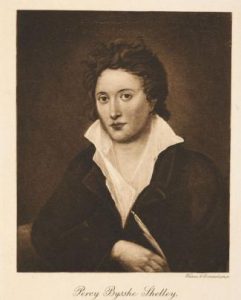
The Cloud
I bring fresh showers for the thirsting flowers,
From the seas and the streams;
I bear light shade for the leaves when laid
In their noonday dreams.
From my wings are shaken the dews that waken
The sweet buds every one,
When rocked to rest on their mother’s breast,
As she dances about the sun.
I wield the flail of the lashing hail,
And whiten the green plains under,
And then again I dissolve it in rain,
And laugh as I pass in thunder.
I sift the snow on the mountains below,
And their great pines groan aghast;
And all the night ’tis my pillow white,
While I sleep in the arms of the blast.
Sublime on the towers of my skiey bowers,
Lightning my pilot sits;
In a cavern under is fettered the thunder,
It struggles and howls at fits;
Over earth and ocean, with gentle motion,
This pilot is guiding me,
Lured by the love of the genii that move
In the depths of the purple sea;
Over the rills, and the crags, and the hills,
Over the lakes and the plains,
Wherever he dream, under mountain or stream,
The Spirit he loves remains;
And I all the while bask in Heaven’s blue smile,
Whilst he is dissolving in rains.
The sanguine Sunrise, with his meteor eyes,
And his burning plumes outspread,
Leaps on the back of my sailing rack,
When the morning star shines dead;
As on the jag of a mountain crag,
Which an earthquake rocks and swings,
An eagle alit one moment may sit
In the light of its golden wings.
And when Sunset may breathe, from the lit sea beneath,
Its ardours of rest and of love,
And the crimson pall of eve may fall
From the depth of Heaven above,
With wings folded I rest, on mine aëry nest,
As still as a brooding dove.
That orbèd maiden with white fire laden,
Whom mortals call the Moon,
Glides glimmering o’er my fleece-like floor,
By the midnight breezes strewn;
And wherever the beat of her unseen feet,
Which only the angels hear,
May have broken the woof of my tent’s thin roof,
The stars peep behind her and peer;
And I laugh to see them whirl and flee,
Like a swarm of golden bees,
When I widen the rent in my wind-built tent,
Till calm the rivers, lakes, and seas,
Like strips of the sky fallen through me on high,
Are each paved with the moon and these.
I bind the Sun’s throne with a burning zone,
And the Moon’s with a girdle of pearl;
The volcanoes are dim, and the stars reel and swim,
When the whirlwinds my banner unfurl.
From cape to cape, with a bridge-like shape,
Over a torrent sea,
Sunbeam-proof, I hang like a roof,
The mountains its columns be.
The triumphal arch through which I march
With hurricane, fire, and snow,
When the Powers of the air are chained to my chair,
Is the million-coloured bow;
The sphere-fire above its soft colours wove,
While the moist Earth was laughing below.
I am the daughter of Earth and Water,
And the nursling of the Sky;
I pass through the pores of the ocean and shores;
I change, but I cannot die.
For after the rain when with never a stain
The pavilion of Heaven is bare,
And the winds and sunbeams with their convex gleams
Build up the blue dome of air,
I silently laugh at my own cenotaph,
And out of the caverns of rain,
Like a child from the womb, like a ghost from the tomb,
I arise and unbuild it again.
Percy Bysshe Shelley
(1792 – 1822)
The Cloud
• fleursdumal.nl magazine
More in: Archive S-T, Archive S-T, Shelley, Percy Byssche
Anything the Landlord Touches was Emma Lew’s second collection to be published in Australia.
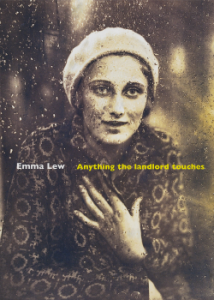 The book won the C.J. Dennis Prize for Poetry (the Victorian State Premier’s award for poetry), and the Judith Wright Calanthe Award (the Queensland Premier’s Prize for Poetry), two of the main literary prizes in the country, and was also short-listed for The Age award and the NSW and South Australian Premier’s Literary Prizes.
The book won the C.J. Dennis Prize for Poetry (the Victorian State Premier’s award for poetry), and the Judith Wright Calanthe Award (the Queensland Premier’s Prize for Poetry), two of the main literary prizes in the country, and was also short-listed for The Age award and the NSW and South Australian Premier’s Literary Prizes.
Emma Lew lives in Melbourne. Her first collection of poems, The Wild Reply (1997), won the Mary Gilmore Award and was joint winner of the Age Poetry Book of the Year Award. Her second collection, Anything the Landlord Touches (2002), won the Victorian Premier’s C. J. Dennis Prize for Poetry and the Queensland Premier’s Judith Wright Calanthe Prize for Poetry. A selection of German language translations of her poems by Mirko Bonne was published under the title Nesselgesang in 2008. Crow College: New and Selected Poems was published by Giramondo in 2019.
Anything the Landlord Touches
by Emma Lew
Poetry
Giramondo Publishing Australia
96 pages
Paperback
21 x 15 cm
2002
ISBN 0957831161
$22.00
• fleursdumal.nl magazine
More in: #Editors Choice Archiv, - Book News, - Bookstores, Archive K-L, Archive K-L
Benjamin Heisenbergs Roman «Lukusch» ist eine wilde und witzige Fahrt durch die unfassbare Geschichte des jungen Schachtalents Anton Lukusch und seines grobschlächtigen Sidekicks Igor.
 Klug und lässig zugleich spielt dieser Roman mit den Möglichkeiten des Erzählens und sprengt dabei seine eigenen Grenzen.
Klug und lässig zugleich spielt dieser Roman mit den Möglichkeiten des Erzählens und sprengt dabei seine eigenen Grenzen.
Anton Lukusch war ein ganz normaler Junge aus Prypjat – bis zur Reaktorkatastrophe von Tschernobyl 1986. Gemeinsam mit anderen Kindern wird er von der Hilfsorganisation Shelta nach Westdeutschland gebracht, um der hohen Strahlenbelastung zu entkommen.
Dort beginnt für ihn ein ganz neues Leben: Durch Zufall wird Lukuschs analytisches Talent beim Schachspielen entdeckt. Ein Überflieger, ein Wunderkind – die Bundesrepublik jubelt! Vor den Augen der Öffentlichkeit gewinnt er eine Partie gegen Bundeskanzler Helmut Kohl, knackt ein scheinbar unlösbares Rätsel bei Wetten, dass … und wird sogar von internationalen Konzernen als Berater verpflichtet.
Ihn selbst scheint seine spektakuläre Erfolgsgeschichte kaum zu interessieren. Wie ferngesteuert löst Anton alle ihm gestellten Aufgaben, lächelt brav in die Kameras und lässt sich von seinem Umfeld herumreichen wie ein teures Spielzeug, mit dem man im Scheinwerferlicht glänzen kann. Ist dieser Junge wirklich «nur» ein herausragendes Talent, und was hat es mit seinem ständigen Schatten Igor auf sich? Antons spurloses Verschwinden ist nur der Anfang höchst kurioser Entwicklungen …
Benjamin Heisenberg, geboren 1974 in Tübingen, arbeitet als Regisseur, Autor und bildender Künstler. Seine Arbeiten erhielten namhafte Auszeichnungen.
Heisenberg, Benjamin
Lukusch
Roman
Publisher: C.H.Beck; 1st edition
15 Sept. 2022
Language: German
Hardcover: 270 pages
ISBN-10: 340679095X
ISBN-13: 978-3406790959
Dimensions: 14.2 x 2.6 x 21.9 cm
€25.00
• fleursdumal.nl magazine
More in: - Book News, - Bookstores, Archive G-H, Chess in literature
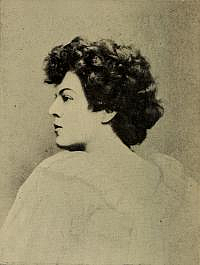
Sixteen Dead Men
Hark! in the still night. Who goes there?
“Fifteen dead men” Why do they wait?
“Hasten, comrade, death is so fair.”
Now comes their Captain through the dim gate.
Sixteen dead men! What on their sword?
“A nation’s honour proud do they bear.”
What on their bent heads? “God’s holy word;
All of their nation’s heart blended in prayer.”
Sixteen dead men! What makes their shroud?
“All of their nation’s love wraps them around.”
Where do their bodies lie, brave and so proud?
“Under the gallows-tree in prison ground.”
Sixteen dead men! Where do they go?
“To join their regiment, where Sarsfield leads;
Wolfe Tone and Emmet, too, well do they know.
There shall they bivouac, telling great deeds.”
Sixteen dead men! Shall they return?
“Yea, they shall come again, breath of our breath.
They on our nation’s hearth made old fires burn.
Guard her unconquered soul, strong in their death.”
Dora Maria Sigerson Shorter
(1866 – 1918)
Sixteen Dead Men
From The Tricolour: Poems of the Irish Revolution (1922)
• fleursdumal.nl magazine
More in: Archive S-T, Archive S-T, Sigerson Shorter, Dora Maria, WAR & PEACE
Im Selbstporträt verkörpert sich programmatisch das Grundwesen der Moderne.
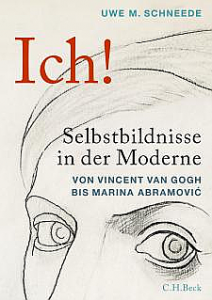 So wie das christliche Altarbild im Mittelalter oder die Landschaft in der Romantik, so stellt das Selbstporträt die neue symbolhafte Gattung in der Kunst des 20. Jahrhunderts dar. Erstmals liegt nun mit diesem Buch eine umfassende Überblicksdarstellung über das Selbstporträt in der Moderne vor.
So wie das christliche Altarbild im Mittelalter oder die Landschaft in der Romantik, so stellt das Selbstporträt die neue symbolhafte Gattung in der Kunst des 20. Jahrhunderts dar. Erstmals liegt nun mit diesem Buch eine umfassende Überblicksdarstellung über das Selbstporträt in der Moderne vor.
Selbstbildnisse sind keine Erfindung der Moderne. Sie kamen bereits in der Renaissance auf – jedoch rückte die Gattung erst im 20. Jahrhundert in den Mittelpunkt und wurde zum zentralen Anliegen der Künstlerinnen und Künstler. Während es zunächst in den Werken von Vincent van Gogh, Edvard Munch, Käthe Kollwitz oder Paula Modersohn-Becker um eine schonungslose Selbstanalyse ging, gerät ab 1960 der eigene Körper als Akteur in den Blick – so etwa bei Bruce Nauman, Cindy Sherman, Marina Abramovic oder Joseph Beuys.
Uwe M. Schneede schildert eindrucksvoll, wie sich über einen Zeitraum von über hundert Jahren die inhaltlichen und formalen Beweggründe immer wieder paradigmatisch verändert haben – und erzählt so am Beispiel des Selbstbildnisses eine andere Geschichte der modernen Kunst.
Uwe M. Schneede war von 1991 bis 2006 Direktor der Hamburger Kunsthalle, zuvor lehrte er Kunstgeschichte der Moderne an der Ludwig-Maximilians-Universität in München.
Schneede, Uwe M.
Ich!
Selbstbildnisse in der Moderne
978-3-406-78747-8
Erschienen am 12. September 2022
240 S., mit 96 Abbildungen
Hardcover
€ 29,95
• fleursdumal.nl magazine
More in: - Book News, - Bookstores, Archive S-T, Art & Literature News, Art Criticism, Joseph Beuys, Käthe Kollwitz, Marina Abramović, Poets' Portraits
The Great Bear
by Leo Tolstoy
A long, long time ago there was a big drought on the earth. All the rivers dried up and the streams and wells, and the trees withered and the bushes and grass, and men and beasts died of thirst.
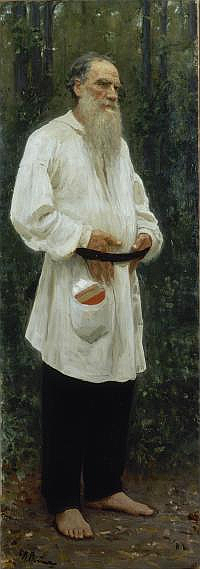 One night a little girl went out with a pitcher to find some water for her sick mother. She wandered and wandered everywhere, but could find no water, and she grew so tired that she lay down on the grass and fell asleep. When she awoke and took up the pitcher she nearly upset the water it contained. The pitcher was full of clear, fresh water. The little girl was glad and was about to put it to her lips, but she remembered her mother and ran home with the pitcher as fast as she could. She hurried so much that she did not notice a little dog in her path; she stumbled over it and dropped the pitcher. The dog whined pitifully; the little girl seized the pitcher.
One night a little girl went out with a pitcher to find some water for her sick mother. She wandered and wandered everywhere, but could find no water, and she grew so tired that she lay down on the grass and fell asleep. When she awoke and took up the pitcher she nearly upset the water it contained. The pitcher was full of clear, fresh water. The little girl was glad and was about to put it to her lips, but she remembered her mother and ran home with the pitcher as fast as she could. She hurried so much that she did not notice a little dog in her path; she stumbled over it and dropped the pitcher. The dog whined pitifully; the little girl seized the pitcher.
She thought the water would have been upset, but the pitcher stood upright and the water was there as before. She poured a little into the palm of her hand and the dog lapped it and was comforted. When the little girl again took up the pitcher, it had turned from common wood to silver. She took the pitcher home and gave it to her mother.
The mother said, “I shall die just the same; you had better drink it,” and she handed the pitcher to the child. In that moment the pitcher turned from silver to gold. The little girl could no longer contain
herself and was about to put the pitcher to her lips, when the door opened and a stranger entered who begged for a drink. The little girl swallowed her saliva and gave the pitcher to him.
And suddenly seven large diamonds sprang out of the pitcher and a stream of clear, fresh water flowed from it. And the seven diamonds began to rise, and they rose higher and higher till they reached the sky and became the Great Bear.
Short Stories
The Great Bear by Leo Lolstoy (1828-1910)
From: Tolstoi for the young. Select tales from Tolstoi
Translator: R. S. Townsend (1916)
• fleursdumal.nl magazine
More in: #Short Stories Archive, Archive S-T, Tolstoy, Leo
14 International Younger Poets, edited and with an introduction by Philip Nikolayev, features verse by brilliant poets aged under 35 from India and the United States, with two of the participants originally hailing from Eastern Europe.
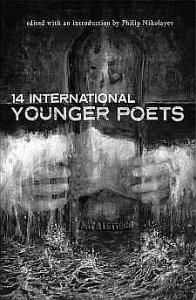 These remarkable young men and women, who first met each other in a virtual poetry recital, have quickly formed an active poetic community held together by aesthetic affinities, like values, and camaraderie. Their styles and ideas exhibit a crosspollinating diversity, and their spirit is indomitably humanist.
These remarkable young men and women, who first met each other in a virtual poetry recital, have quickly formed an active poetic community held together by aesthetic affinities, like values, and camaraderie. Their styles and ideas exhibit a crosspollinating diversity, and their spirit is indomitably humanist.
The poets question both themselves and the world, constantly negotiating their human, moral, and literary standing in it. Welcome to fourteen captivating quests for poetic excellence!
Avinab Datta-Areng (India), Raquel Balboni (USA), Justin Burnett (USA), Blake Campbell (USA), Sumit Chaudhary (India), Zainab Ummer Farook (India), Emily Grochowski (Poland & USA), Chandramohan S. (India), Susmit Panda (India), Paul Rowe (USA), Shruti Krishna Sareen (India), Andreea Iulia Scridon (Romania & UK), Kamayani Sharma (India), Sam Wronoski (USA).
14 International Younger Poets
Edited and with introduction by Philip Nikolayev
MadHat Press
Imprint: Art and Letters
Language: English
Paperback, 154 pp
ISBN-13: 978-1-952335-23-5
$22.00
• fleursdumal.nl magazine
More in: #Editors Choice Archiv, #More Poetry Archives, - Book News, Archive M-N
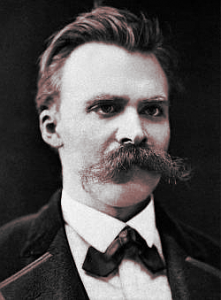
Ecce homo
Ja! Ich weiß, woher ich stamme!
Ungesättigt gleich der Flamme
Glühe und verzehr′ ich mich.
Licht wird alles, was ich fasse,
Kohle alles, was ich lasse:
Flamme bin ich sicherlich.
Friedrich Nietzsche
(1844 – 1900)
Ecce homo
• fleursdumal.nl magazine
More in: Archive M-N, Archive M-N, Friedrich Nietzsche, Nietzsche

The art of divisibility
She wants my time
but not in rows of measures
or in the control of mathematics
but in the hidden measurements
of being together, of feeling
without addition or subtraction.
Having someone’s space in time
is all that can be truly given freely.
When we adjust so time does,
as we shift to the warmth of company,
which is what can be said
for these moments of value
to be understood as precious.
We control time and divide it into two,
an equal share for both of us, as we
become living geometry and curve
around each other’s cogent and form.
Vincent Berquez
Poem: The art of divisibility
Vincent Berquez is a London–based artist and poet
• fleursdumal.nl magazine
More in: Archive A-B, Archive A-B, Berquez, Vincent, Vincent Berquez
This is a book of tragicomic gurlesque word-witchery inspired by the Kate Bush cosmos.
 Campily glamorous, darkly funny, obsessively ekphrastic, boozily baroque, psychedelically girly & musically ecstatic, 50 Things Kate Bush Taught Me About the Multiverse dazzles as Karyna McGlynn’s third collection of poems.
Campily glamorous, darkly funny, obsessively ekphrastic, boozily baroque, psychedelically girly & musically ecstatic, 50 Things Kate Bush Taught Me About the Multiverse dazzles as Karyna McGlynn’s third collection of poems.
Karyna McGlynn is a writer, professor & collagist living in Memphis. She is the author of I Have to Go Back to 1994 and Kill a Girl (Sarabande 2009) and Hothouse (Sarabande 2017), which was a New York Times Editor’s Choice.
Karyna holds an MFA in Poetry from the University of Michigan, and a PhD in Creative Writing & English Literature from the University of Houston. Recent honors include the Diane Middlebrook Poetry Fellowship at the University of Wisconsin, a visiting professorship at Oberlin College, the Rumi Prize for Poetry selected by Cate Marvin, and the Florida Review Editors’ Award in Fiction. With Erika Jo Brown, she’s co-editing the anthology Clever Girl: Witty Poetry by Women.
50 Things Kate Bush Taught Me About the Multiverse
Karyna McGlynn
Publisher: Sarabande Books
April 26, 2022
Language: English
Paperback: 96 pages
ISBN-10: 194644894X
ISBN-13: 978-1946448941
€ 23,10
• fleursdumal.nl magazine
More in: #Editors Choice Archiv, - Book News, Archive M-N, Archive M-N, Kate Bush
A man returns home to the hearts of the great spaces.
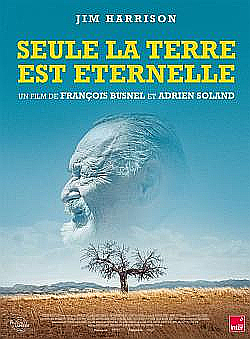 He recounts his life, which he burned by both ends and which reveals another History of America. Also, through his own history and his characters, he tells his relationship to the world.
He recounts his life, which he burned by both ends and which reveals another History of America. Also, through his own history and his characters, he tells his relationship to the world.
Through this spiritual and joyful testament, from Livingston MO to Patagonia AZ, he invites you to go back to basics and live in harmony with Nature.
This man is one of the greatest American writers and poets. His name is Jim Harrison.
Jim Harrison was born in 1937 in Grayling, Michigan, USA. He was a writer, poet and producer, known for Wolf (1994), Revenge (1990) and Legends of the Fall (1994). He died in 2016 in Patagonia, Arizona, USA.
‘Seule la terre est éternelle’
Documentary 2019
1h 56m
Directors: François Busnel & Adrien Soland
Writer: François Busnel
Stars: Jim Harrison, Louise Erdrich, Jim Fergus
François Busnel is a writer and producer, known for Seule la terre est éternelle (2019), Les Grands Mythes (2014) and Mythologies (2001).
• fleursdumal.nl magazine
More in: Archive G-H, Archive G-H, AUDIO, CINEMA, RADIO & TV, Harrison, Jim, Jim Harrison, Western Fiction, Western Non-Fiction
For more than 30 years, S corresponds with her first love, J.
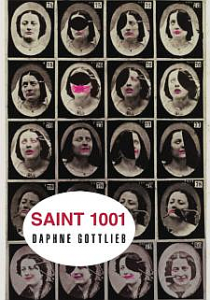 There is one story she does not tell: one about three men and an alley. She learns a new story: one in which she is unable to leave the two blocks surrounding her house, and unable to tell J exactly what happened to her. Isolated by trauma and depression, S finds a way back into her skin through the strangers she meets online for sex.
There is one story she does not tell: one about three men and an alley. She learns a new story: one in which she is unable to leave the two blocks surrounding her house, and unable to tell J exactly what happened to her. Isolated by trauma and depression, S finds a way back into her skin through the strangers she meets online for sex.
The retellings of her adventures titillate J, who urges her on to more encounters. As in the 1001 Nights, this is a story made of stories: S’s own stories are interrupted and overwritten by similar, culturally reified stories. S’s life becomes scenes from everything from The Graduate and The Story of O to the words of Charles Manson and the Bible.
What emerges in words, invocations and collage is a grasping at presence and absence in the age of the internet: to be read in real time is life, and the blank screen is death.
San Francisco-based Performance Poet Daphne Gottlieb stitches together the ivory tower and the gutter just using her tongue. She is the author and editor of 10 books, most recently the short stories “Pretty Much Dead. She is also the author of five books of poetry, two anthologies, and a graphic novel with artist Diane DiMassa. She is also the co-editor (with Lisa Kester) of Dear Dawn: Aileen Wuornos in her Own Words, letters from the “First Female Serial Killer” from Death Row to her childhood best friend.
She is the winner of the Acker Award, the Audre Lorde Award in Poetry, the Firecracker Alternative Book Award, and a five-time finalist for the Lambda Literary Award.
Gottlieb teaches graduate-level creative writing, and has also performed and taught creative writing workshops at all levels around the country. She received her MFA from Mills College.
Saint 1001
by Daphne Gottlieb
Publisher: MadHat Press
2021
Language: English
Paperback: 264 pages
ISBN-10: 1952335256
ISBN-13: 978-1952335259
$21.95
• fleursdumal.nl magazine
More in: #Editors Choice Archiv, - Book News, - Bookstores, Archive G-H, Archive G-H
Thank you for reading Fleurs du Mal - magazine for art & literature